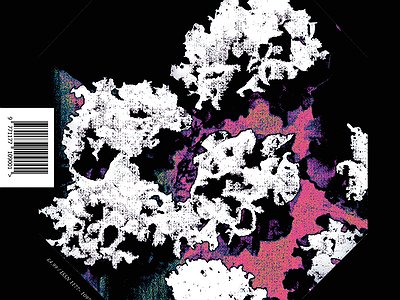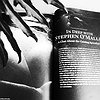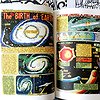Part 2
Can you take me through your writing process on the basis of a piece that's particularly dear to you? How do you decide what to write about, what do you usually start with when working on a new piece, what sources will you draw from for research purposes and how does a piece gradually take shape?
My process is always changing and developing and is different now as I have less time to devote to writing – though I have a much deeper pool of knowledge to draw upon than when I began. But I still like to read everything that has been previously written on the artist which I can get my hands on. When writing about music, that involves printing off everything that is online and tracking down any articles from the Wire, or other print media. Of course we track down as much music as possible and listen to it as much as possible. I often conduct interviews. I always want to pool together as many resources as possible while looking to generate new material to add to the existing body. The style and tone of the article comes from the textures contained and patterns revealed in the gathered material. And, as I spoke of earlier, this would all be happening in conversation, particularly with Mark and our assistant editor Nick Yeck-Stauffer, so there would be a collective processing of the music. Usually before I've written a word I've already developed some phrases and language around the work through these conversations. When reading about artists, I often get great ideas from reading stuff I don't like. Everything I read sets into play different processes. I like to write down ideas by hand and brainstorm a lot before I start using a computer. And I surround myself with visual materials connected to the work. As much as possible I try and make the writing process tangible. I try to think and listen through my body.

Recently I interviewed Stephen O'Malley and the transcript appears in the new issue of White Fungus. This piece is particularly exciting to me because it was generated from a real live event, an encounter - meeting O'Malley - as well as a response to his work, the exhibition Unground at The Cube, which O'Malley created sound for; and a performance by him at The Wall. This was a rare instance in which you meet someone who you can engage with using ideas and material you've been developing over the years but haven't had the opportunity to put into any form. It is conversation as collaboration and the coming together of different and related lines of thought. It feels like a live event, which is what it's drawn from. Being based first in Wellington, and now in Taichung City in Taiwan, isolation has often dictated the approach. But I would like to do more pieces in the way that I produced the O'Malley text.
Music journalism has frequently been attacked for merely expressing opinion. On the other hand, both positive or negative opinions can be string motivators for in-depth journalism. How would you describe the importance of subjectivity for your writing?
Subjectivity is great when it is fully formed and well-articulated; and honest and transparent about what it is and where it's coming from. But I don't think that subjectivity is exactly the same thing as opinions, which we hear far too much of in an age of instant gratification and “like” button clicks. The key for me is that I like to lose myself in music just as I do in reading. I want to become completely immersed in the material. Too much writing these days about music – and all topics really – is about the individual rather than the subject of the article. Or perhaps it would be more accurate to say that the subject in truth has become the identity of the person writing the piece, rather that the work in question. Suffice to say I can't stand the dominant narcissistic identity-obsessed culture of this era.
There has been an exponential growth in promotion agencies. What's your perspective on the promo system? In how far is it influencing your choice of artists and topics, in how far is it useful for pre-selection, in how far do you feel it is possibly undermining journalistic freedom?
Like many disciplines in this era, journalism has gone underground. You have to do it despite the system, not as a natural consequence of it. This era is fully about marketing and publicity. Journalism suddenly feels like an archaic idea. But then I've never cared to run with the herd.
What are the most important conclusions you've drawn from the changes in the publishing landscape? How do they affect journalism in general and your own take on writing in particular?
It's a paradoxical age. Never have the tools been so readily available to individuals for creating their own platforms. It doesn't take much to start being a producer. But peoples' attention spans are remarkably limited, no one has any money and everyone is overworked. There's not a great demand for journalism, and there concurrently isn't a great supply. But where there's a will there's a way, and who knows what the future might bring.
Whom do you feel your obligation to – the artists, the readers, the publication you're writing for?
All of the above. I simply feel an obligation to do the best work I can and know that, whatever the outcome, it was the best I could do in that situation and in those conditions.
Social media are allowing for a closer relationship between listeners, readers and journalists than ever before. Do you see this as a potential improvement or rather as a problem?
So close, so far away. I don't know how close it is really. I mean in a superficial sense I'm close to hundreds of people via social media, but it's a very limited form of interaction. It's good for doing business and networking etc. But I don't think it's a great way of forming a close relationship your audience. That happens when you meet people at events or receive letters, packages or other forms of communication. Social media is superficial, but it's the world we're living in now and must be dealt with strategically.
Is there a new media format for presenting great new music away from standard formats such as interviews or reviews that you would find exciting and which hasn't been realised yet?
I would like to experience formats which are more curated than exhaustive. It would save a lot of time. There's so much incredible stuff all over the Internet, but I'd like there to be more curation, just as I enjoyed DJ mixes in the 90s and 2000s. There's a lot of great material out there but it's not really coming together in a coherent way.
Follow Mark Hanson's writing and ideas as well all of his various projects through the White Fungus website.








